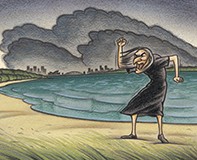Innocence revisited – 17
This month Professor Sir John Scott relates a vivid tale of the unexpected.
Spellbound
The doctor’s duty
While trying to finance a forthcoming trip to the UK for postgraduate training, I undertook an extended locum in general practice. One Sunday afternoon, despite being off duty, I received a call from a very disturbed woman. She said repeatedly, ‘I’ve got the key, I’ve got the key, doctor’. Eventually when she calmed down, I worked out that I was needed on the foreshore of a quite desirable suburb. I proceeded there in my grubby gardening clothes.
On the footpath outside of what had once been a hotel (now with most of the ground floor windows boarded up) was an agitated woman in her forties. The local police sergeant was there also. He got in first: ‘I can’t help doctor, my bosses say I can’t intervene.’
Gradually I pieced together that the agitated woman’s very ill mother was inside, caught in the web of what would have led to an execution at Salem. The woman’s mother needed to go to hospital, but her companion who was with her (a slightly older woman, also in her seventies) was preventing that course of action.
Such was the power of the older woman over the mother that she had told the daughter and police to go away. The police had no jurisdiction.
Via subterfuge the daughter had obtained the house key from the companion. She placed it in my hand, giving me clear instructions that it was my duty as a doctor to go into the building and arrange for the transfer of her mother to hospital.
A startling experience
With considerable trepidation, but with some comfort having the policeman as a witness, I unlocked the door and one of the most startling experiences of my career unfolded.
The room stank. The walls were lined with scrim on which some newspaper illustrations were stuck here and there. Stacked against the walls were piles of old newspapers tied together. On top of some were half-empty milk bottles full of cheese and mould – hence the stink. This was compounded by the smell coming from a sack stretcher on which lay a grossly oedematous woman, her own serum binding her to the sacks. The woman could barely open her eyes because of the facial oedema.
Walking in the room in circles was a hunch-backed woman with the classical hooked nose of a witch. She was thin and scrawny and had a screeching voice. She walked around looking at the floor, saying repeatedly, ‘I think there is a doctor in the room, there is a doctor here somewhere’. She and I conducted a macabre dance in which I ducked from side to side, hoping that her gaze did not fix upon me.
I rapidly and superficially examined the mother and diagnosed a combination of scurvy and beriberi. I then withdrew, retaining the key. As I did so, the mother struggled to open her eyes and looked towards me with a pathetic gaze that haunts me still. The sergeant also saw that look and rushed out to order an ambulance, which arrived soon afterwards.
Threats of vengeance
We waited until the mother was detached from the bed to which she had obviously been stuck for a few weeks. As the dying woman was taken to the ambulance, her witch-like companion became increasingly agitated and finally charged down the road to the beach. My last view of her was as she stood against the skyline, with the harbour in the background, cursing me (the doctor), shaking her fist in the air and swearing vengeance upon me and mine.
The mother was transferred to a public geriatric hospital and died about 12 hours later. At autopsy she was diagnosed with beriberi, scurvy and septicaemia.
It transpired that while working for decades as seamstresses for an upmarket department store, the two elderly women had formed a close relationship. For several years their only other human contact, apart from the odd shopkeeper, had been the daughter of the younger woman. The witch-like seamstress had complete power over the mother and had become progressively possessive of her.
Various authorities seemed either indifferent or reluctant to intervene in such situations, and no one provided any help to the daughter. No clear-cut legal or formal arrangements were extant to handle the situation that the daughter had tried to describe, albeit incoherently, for several weeks before her mother’s demise.
The witch lived on for about another three months, then died suddenly.
Who is our sister’s keeper?
This event took place a little over 40 years ago. The police sergeant and I were fortunate that no lawyers were involved in the interchanges that afternoon. At the beginning of the third millennium we are not that much further forward in deciding who is our sister’s keeper. Nevertheless, medical practitioners are well advised to think ahead as to how they might act when the occasional extraordinary circumstance occurs. Innocence is no defence. MT

